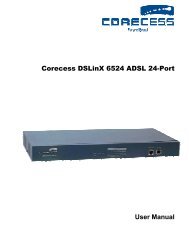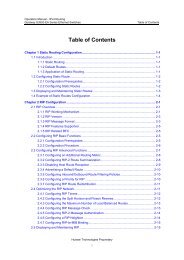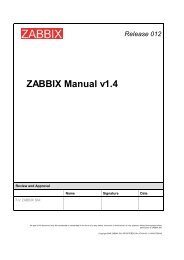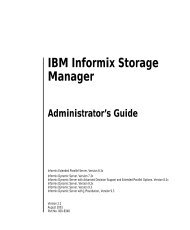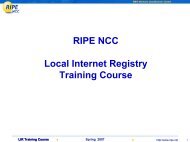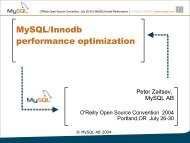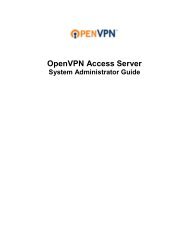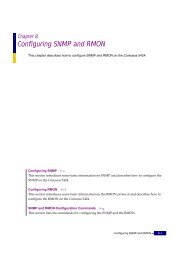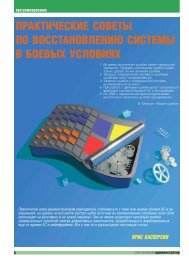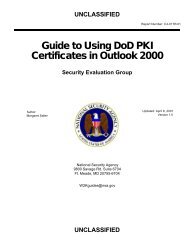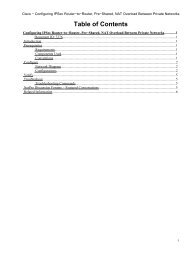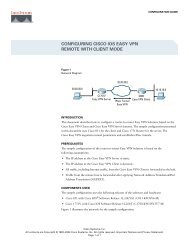Solaris Application Programming, 1/e - Chapter 4 - Parent Directory
Solaris Application Programming, 1/e - Chapter 4 - Parent Directory
Solaris Application Programming, 1/e - Chapter 4 - Parent Directory
You also want an ePaper? Increase the reach of your titles
YUMPU automatically turns print PDFs into web optimized ePapers that Google loves.
90 <strong>Chapter</strong> 4 Informational Tools<br />
4.5.6 Reporting the Size of the Various Segments in an <strong>Application</strong>,<br />
Library, or Object (size)<br />
The size utility prints the size in bytes of the various segments in an application,<br />
library, or object file. When used without parameters the command reports the size<br />
of the text (executable code), data (initialized data), and bss (uninitialized data).<br />
The -f flag reports the name of each allocatable segment together with its size in<br />
bytes. The -n flag also reports the nonloadable segments (these segments contain<br />
metadata such as debug information). An example is shown in Example 4.62.<br />
Example 4.62 Using the size Command<br />
% size a.out<br />
3104 + 360 + 8 = 3472<br />
% size -fn a.out<br />
17(.interp) + 304(.hash) + 592(.dynsym) + 423(.dynstr) + 48(.SUNW_version) +<br />
12(.rela.data) + 72(.rela.plt) + 1388(.text) + 16(.init) + 12(.fini) + 4(.rodata) +<br />
4(.got) + 124(.plt) + 184(.dynamic) + 48(.data) + 8(.bss) + 1152(.symtab) +<br />
525(.strtab) + 248(.debug_info) + 53(.debug_line) + 26(.debug_abbrev) + 650(.comment) +<br />
184(.shstrtab) = 6094<br />
4.5.7 Reporting Metadata Held in a File (dumpstabs, dwarfdump,<br />
elfdump, dump, and mcs)<br />
It is possible to extract information about how an application was built using the<br />
dumpstabs utility, which is shipped with the compiler. This utility reports a lot of<br />
information, but the most useful is the command line that was passed to the compiler.<br />
Two other utilities serve a similar purpose: dwarfdump, which reports the<br />
data for applications built with the dwarf debug format, and elfdump which<br />
reports similar information for object files. All three utilities can take various flags<br />
to specify the level of detail, but by default, dumpstabs and elfdump print out all<br />
information, whereas dwarfdump does not report anything for versions earlier<br />
than Sun Studio 11 (in these cases, use the -a flag to print all the information).<br />
<strong>Application</strong>s built with the Sun Studio 10 compiler (and earlier) default to the<br />
stabs format, so dumpstabs is the appropriate command to use. In Sun Studio 11,<br />
the C compiler switched to using dwarf format. In Sun Studio 12, all the compilers<br />
default to using dwarf format.<br />
Example 4.63 shows an example of building a file using Sun Studio 10, and then<br />
using dumpstabs and grep to extract the compile line used to build the file. In<br />
general, a lot of information is reported by dumpstabs, so passing the output<br />
through grep and searching for either the name of the file or the CMDLINE marker<br />
will reduce the output substantially.



